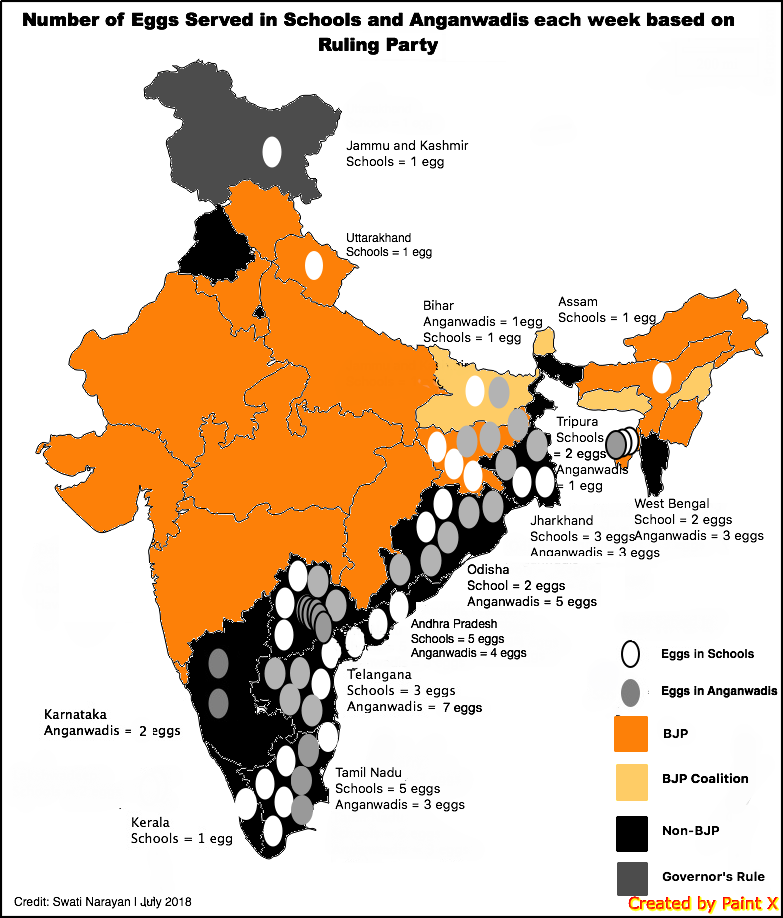New Delhi: While eggs have been established to be an excellent source of protein and all essential nutrients, except vitamin C, for young children, the latest “egg map” – which illustrates how many eggs are distributed per week in mid-day meals served in schools and anganwadis across the country – shows a clear absence of eggs from the menu in most BJP-ruled states.
The National Institute of Nutrition, which works under the aegis of the Indian Council of Medical Research under the Union Ministry of Health and Family Welfare, made the provision of eggs compulsory in mid-day meals, as they are considered cheaper, safer, more nutritious and easier to procure than alternatives such as milk or bananas. Despite this, 11 BJP states have not been serving eggs to children under the scheme.
While Himachal Pradesh, Haryana, Uttar Pradesh, Rajasthan, Gujarat, Madhya Pradesh, Maharashtra, Goa, Chhattisgarh, Arunachal Pradesh and Manipur do not distribute eggs at all, others like Uttarakhand and Assam distribute only one egg per week.
Only Jharkhand and Tripura have a better record – while Jharkhand distributes three eggs per week in both schools and anganwadis, Tripura distributes two eggs per week in schools and one per week in anganwadis.

‘Egg map’ that shows the number of eggs distributed by state governments to children under the mid day meal scheme. Credit: Swati Narayan
Southern, eastern states have a better compliance rate
In comparison, states like Tamil Nadu (five eggs per week in schools and three in anganwadis), Andhra Pradesh (five in schools and four in anganwadis), Telangana (three in schools and seven in anganwadis), Odisha (two in schools and five in anganwadis) and West Bengal (two each in schools and anganwadis) have a much better track record.
In Jammu and Kashmir, the distribution of eggs is a nominal one per week in schools.
In states being ruled by coalitions in which the BJP is a partner, the distribution of eggs under the mid-day meal scheme is also abysmal.
In Bihar, only one egg is distributed per week in both schools and anganwadis, whereas in Meghalaya, Sikkim and Nagaland, eggs are not distributed at all. Non-BJP states such as Punjab, Delhi and Mizoram also do not provide eggs to children, while Kerala only provides one egg per week in schools.
Social, religious considerations
Apart from political reasons, social and religious considerations also come in the way of the distribution of eggs. Nutritionists, paediatricians and policy makers insist that eggs can assist in providing a complete and balanced diet to children. The inclusion of eggs is recommended since egg protein also has high biological value and digestibility.
The National Institute of Nutrition had stated that proteins derived from egg had comparatively higher protein bioavailability of 94%, which was far more than vegetable proteins like bengal gram (76%) and soya bean (54%).
Several states have already implemented the scheme. Andhra Pradesh, taking cognisance of the NIN report last year, decided to make it mandatory to provide eggs to all students studying in government-run schools.
It had directed the district education officers to strictly implement the prescribed menu in mid-day meals and also decided not to exempt any agency or institution like the Akshaya Patra Foundation or ISKCON from not providing eggs to students in the name of religious traditions.
Some BJP states take small steps, others remain defiant
The move has also been finding traction in other BJP states. Last year, eggs were introduced in the scheme in Chhattisgarh’s Balrampur district. Here, children were provided eggs once a week in anganwadi centres to prevent malnutrition. For those who do not eat eggs, the provision of milk and bananas once a week was made.
The issue had also been raised three years ago in Madhya Pradesh when a unique protest was held against chief minister Shivraj Singh Chouhan’s policy of not allowing eggs in mid-day meals across the state. Protestors distributed eggs to the Sahariya children of Shirpura village in Shivpuri district. The money for that meal had come from within the community and the protest was in defiance of Chouhan’s opposition – based on personal reasons – to the idea of serving eggs in a state where about 52% of children are malnourished.
